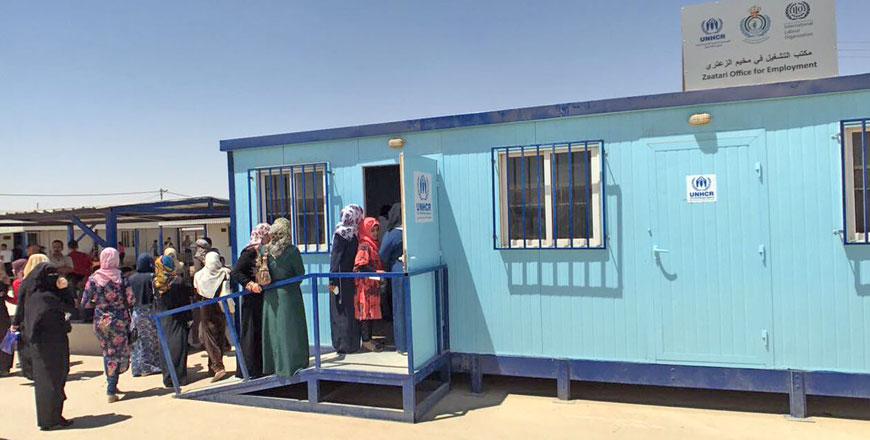You are here
16,000 flexible construction work permits issued for Syrian refugees in 2017
By Ana V. Ibáñez Prieto - Sep 16,2018 - Last updated at Sep 16,2018

The Ministry of Labour announced last week that over 16,000 flexible working permits for Syrian refugees employed in the construction sector were issued over the past year (File photo)
AMMAN — Over 16,000 flexible working permits for Syrian refugees employed in the construction sector have been issued over the past year, the Ministry of Labour announced last week during a workshop organised by the International Labour Organisation (ILO).
The newly issued permits come as the result of an agreement signed by the Labour Ministry, the General Federation of Trade Unions (GFTU) and the ILO in late August 2017, which aimed at organising the work of Syrian refugees in the construction sector in Jordan through the issuance of work permits that allow employees to move from one employer to another.
Head of the Syrian Refugees Department at the Ministry of Labour Hamdan Yacoub told The Jordan Times that “this approach has facilitated the refugees’ access to all professions within the sector and even enabled them to benefit from contracted tasks as a freelancer”, stressing that, under the Labour Law, regular migrant workers can only engage with one employer.
"In order to allow Syrian refugees to move freely within the sector, GTFU has been working as an umbrella sponsor for them rather than employing them under a specific company,” said the project coordinator at the union, Mohammad Maaytah, explaining that "under this regime, work permit holders can perform tasks as a self-employed individual in all cities across the Kingdom".
Having applied the system successfully within the agriculture and construction fields, the Labour Ministry is now looking forward to including sectors such as manufacturing and hospitality under the same approach said Yacoub.
“However, the contractual mechanisms within such sectors are different, and work is still underway in order to further facilitate the access of Syrian refugee workers to other fields,” Yacoub continued, adding the need to maintain the balance between refugee, migrant and Jordanian workers in the target sectors.
“Nevertheless, we [the Labour Ministry] would like to encourage all Syrian refugees to engage with the formal labour market,” the official continued, lamenting that “many of them continue to work in the informal economy due to misinformation and the fear that obtaining a work permit would cause them to lose their refugee status, cash assistance and rights to free settlement in another country”.
“Engaging with the labour market with a proper work permit would not only help organise the economy, but ensure their rights and provide them with guarantees in terms of job security, freedom and human rights,” Maaytah pointed out.
ILO Regional Resilience and Crisis Response specialist Maha Katta discarded the idea that Syrian refugees are hesitant to obtain work permits, noting that “with over 16,000 work permits issued so far under the agreement, it is clear that Syrian refugees are looking forward to formalise their work status”.
“However, most of them are used to working as daily wage workers or in a self-employed regime, and that is what makes it so difficult for them to find a single employer to sponsor them,” Katta continued, noting that the ILO is “advocating to have this flexible scheme expanded to other sectors, in addition to opening the door to inter-sectorial work permits”.
“This would put less of a burden on refugees, as they would not have to issue a new permit each time they wish to move to another employer,” she added, noting that inter-sectorial work permits would also reduce administrative work within governmental entities.
The official also highlighted that obtaining a work permit is “the first step for a refugee to obtain decent working conditions”, as most Syrian refugees working within the informal sector cannot complain about delayed wages, long working hours or any other violations.
Related Articles
AMMAN — The NGO, Care International, on Sunday launched its “Work Permits Protect Your Rights” campaign, aimed at raising awareness among Sy
AMMAN — Several labour rights organisations have recently voiced their concerns over the application of the kafalah (sponsorship) system on
AMMAN — One month after the government’s decision to allow Syrian refugees to obtain work permits, the Zaatari Office for Employment (ZOE) i

















